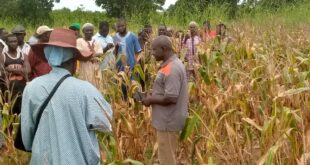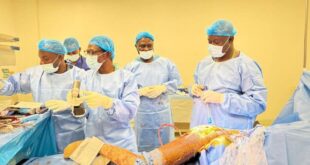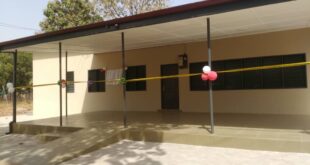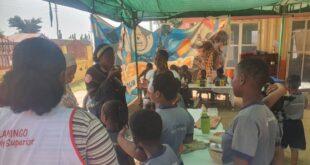Tamale, Ghana – It has been established that too much strenuous physical activities during pregnancy tend to have negative health implications on the mother and unborn baby.
Although physical activities during pregnancy are important, too much of such activities tend to make the woman and her unborn baby too stressed and this impacts on the health of the woman including the baby.
Women who go through too much stress as a result of too much work during their pregnancy period are likely to suffer miscarriage, death of both mother and child as well as other health implications by either the mother or child after delivery.
In order to overcome this, healthcare professionals from 33 health facilities in nine districts of the Upper West, Northern and Volta Regions are being trained to educate women and men to be conscious of providing physical, emotional and material assistance to one another and more especially women during pregnancy and after delivery.
Known as the father-to-father group training, the health professionals are taken through gender concepts to understand how the roles of men and women complement each other and when practiced, it brings about economic improvement in families and communities.
The purpose of the training, therefore, is to use the concepts to do away with the long-held socio-cultural practice of defining roles for men and women as well as boys and girls at the home, workplace and school.
According to Programme Manager of Savana Signatures, Abdul Rashid Imoro, when gender stereotyping is done away by a lot of families and communities, maternal mortality rates would reduce drastically since women would be empowered to take critical decisions that impacts their lives in the absence of their husbands.
“In our cultural setting, the woman would have to get permission from the husband before she can go to the hospital. This contributes to maternal mortality. Again, we all know that a lot of the things that they asked them to eat during pregnancy need finances and the woman always need the support of the man to get these foods to eat. When the man refuse to provide the money for these foods she would lack the energy and other things required to have properly developed pregnancy”, he told Savannah News at a closing ceremony of a 5-day training workshop held in Tamale.
The father-to-father group training is a gender strategy of the Technology for Maternal and Child Health (T4MCH) project being implemented by Savana Signatures with funding support from Global Affairs Canada.
The project seeks to contribute to the reduction of maternal and infant mortality rates which are highest in the 3 beneficiary regions compared to the national average. Currently, 53 father-to-father groups have been formed and so far, 506 men have been reached through monthly facilitations of sessions.
Emmanuel Dery Kuusan, a nutritionist and participant of the training workshop agrees that religious and sociocultural beliefs are contributory factors to the rising cases of maternal and infant mortalities in most rural communities in Ghana.
Mr. Dery, who was participating in the workshop for the second-time, also admits that the training programme is very vital to him and his colleagues who encounter a lot challenges centered on religion and cultural beliefs which makes almost impossible to administer proper healthcare in the communities they work.
According to him, having organized some men in the Kalba community in the Sawla-Tuna-Kalba District where he works, and taught them the lessons he learnt in the previous workshop organized by Savana Signatures, “the men agreed with me that they have not been fair to their wives. And I could see that they didn’t do that intentionally but due to ignorance, they didn’t know”, he indicated.
He told this reporter that, following the implementation of the project, he is beginning to see some positive change in the attitude of the selected participants (men group) in the Kalba community. “I believe that time to come there will be a huge transformation when we are able to scale it up to cover the whole community and the district at large”, Mr. Dery stated.
Going forward, Mr. Dery proposed to the organisers of the training workshop to focus on socio-cultural practices and nutrition in future training programmes. “The issue of socio-cultural practice is the single most striking force that is retarding progress in the health outreach programmes. To the extent that well educated people are so engrossed in these practices we need training so that we would be able to deal with them when we go out to work in the communities”, he opined.
By Savannahnewsonline.com/Philip Liebs
 Savannah News Online Reporting Only What Matters Most
Savannah News Online Reporting Only What Matters Most



